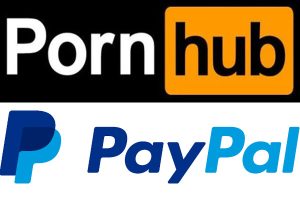The Fallout After Pornhub and PayPal’s Breakup: 100,000 Performers Left Scrambling
 A week after Pornhub announced that PayPal was stopping payouts to performers who used the world’s largest porn-streaming site as a source of income, the fallout continues.
A week after Pornhub announced that PayPal was stopping payouts to performers who used the world’s largest porn-streaming site as a source of income, the fallout continues.
The move was not a huge shock to most in the sex industry. As YNOT’s own Mallory Hall wrote last week, “Given how openly sex negative PayPal is, why was it even being used/offered as a payout option [by Pornhub] in the first place? If you are even remotely or obliquely connected to the sex work and/or sex media industries, do not use PayPal.”
Still, according to Pornhub’s blog post, at least 100,000 performers were using PayPal as of the time the announcement was made. That’s a lot of people who are now scrambling to get their paychecks on perfectly legal content.
And the media went nuts. The Times of London’s Shanti Das suggested that that publication played a role in further marginalizing sex workers. “PayPal has stopped processing payments for the world’s biggest pornography website after it was found to be hosting illegal content, including videos depicting child sexual abuse,” wrote Das. “The decision comes after an investigation by The Sunday Times, published a fortnight ago, found Pornhub to be hosting illegal content including child abuse videos.”
As YNOT has already pointed out, it’s unclear whether the “illegal content” that got consumer goods companies Heinz and Unilever into trouble was actually illegal videos of underage individuals or staged, consensual entertainment. But why look for facts when there’s a media circus to join?
Since the announcement went out last Wednesday, PayPal made a feint to suggest that it wasn’t the performers themselves who had screwed up by, you know, being sex workers. “Following a review, we have discovered that Pornhub has made certain business payments through PayPal without seeking our permission,” PayPal told Samantha Cole of Vice when she asked for a comment. “We have taken action to stop these transactions from occurring.”
But Joseph Wilkinson of The New York Daily News learned otherwise: “Pornhub spokesperson Chris Jackson said in an email to the Daily News that ‘PayPal has since confirmed that ‘business payments’ apply simply to overall payouts to models in our Model Program.’” And then, wrote Wilkinson, “PayPal confirmed to The News it applied exclusively to model payments.”
Seems that, if PayPal’s beef was actually with Pornhub’s business payments, then sex workers wouldn’t be bearing the brunt of the decision’s impact. As Cole pointed out, “PayPal is one of many payment processors that have discriminated against sex workers for years. Its acceptable use policy states that ‘certain sexually oriented materials or services’ are forbidden—phrasing that’s intentionally vague enough to allow circumstances like this to happen whenever the company wants.”
No big deal, right?
Except it is a big deal. Sex workers have always been a marginalized group, but online payment processors and the banks they work with have made things particularly difficult in recent years. As Gizmodo’s Whitney Kimball wrote, “The cumulative effect of financial discrimination, by banks and payment processors, is that people conducting totally legal business have to resort to less lucrative platforms or, in some cases, potentially more dangerous offline encounters.”
In the meantime, as thousands of models around the world cast about for ways to get paid, Pornhub is encouraging them to switch to different payment methods, like direct deposit or cryptocurrency. Online crypto communities are, justifiably, very excited by the prospect. But, as Jay Peters of The Verge noted, “It seems like a reach to expect the hundred thousand performers to switch over to a single type of cryptocurrency for their paychecks…and direct deposit may also be dicey for some: a number of banks refuse to serve sex workers.”
A fine kettle of fish, truly. One might wonder why on earth Pornhub, perhaps the world’s most prominent porn website, responsible for paying who knows how many performers every week, was even doing business with PayPal in the first place. Last year, Pornhub told The Verge, “PayPal specifically is a method of payment that many people, who may not have the luxury of a bank account, rely on to get paid.” Which is a good point.
Still, the relationship between the two online titans seemed, in retrospect, to be doomed. It seems as if it should have been well within Pornhub’s capacity to see this coming and help its performers switch over on a longer, less-frantic timeline.













